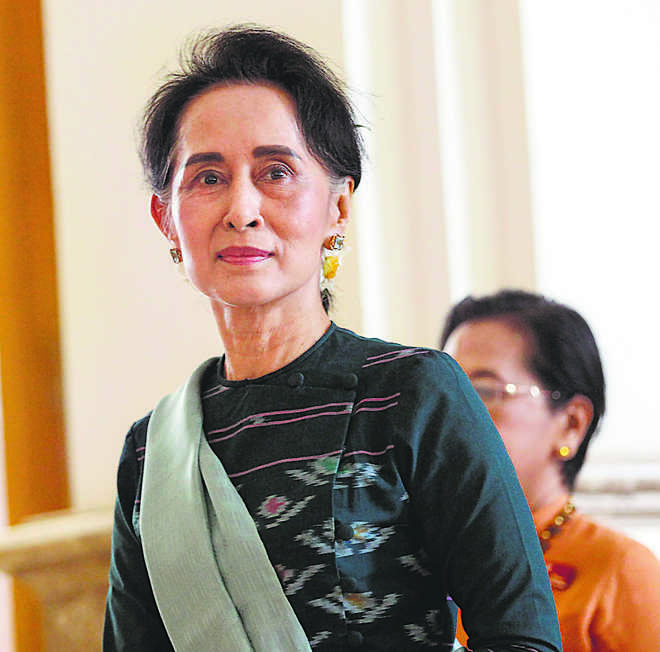
“A peaceful world where we can sleep in security and wake in happiness” remains an elusive song in Myanmar — and Ms Suu Kyi its flawed poetess.
Smita Sharma
“When I met Burmese migrant workers and refugees during my recent visit to Thailand, many cried out: ‘Don't forget us!’ They meant: ‘Don't forget our plight, don't forget to do what you can to help us, don't forget we also belong to your world.'” That was Aung San Suu Kyi delivering her peace lecture in Oslo on 16 June 2012 — nearly 21 years after she was bestowed upon the Nobel Peace Prize. World over, the nobility and the moral charisma behind those words were heard in respect and gratitiude.
Twenty years later, she is now in power as the State Counsellor. And the world hears Suu Kyi defending the reasons that have forced lakhs of her country's people to become refugees in foreign lands. The Nobody's people shunned at several borders, left to live in heart-wrenching conditions or to just die. Facing scathing international criticism on the country's handling of the Rohingya crisis, Suu Kyi broke her long silence, a television address in English, to address a global audience from Naypyitaw. She tried striking the right notes, but left a lot to be desired.
Suu Kyi claimed that “Myanmar condemns all human rights violation” and “feels deeply” for the “suffering of all groups” in Rakhine state. She used the word “Rohingya” only once in her address in the context of the Arakan Rohingya Salvation Army (ARSA), branded a terrorist organisation by her government.
A defiant Suu Kyi said Myanmar does not fear “international scrutiny” and that her government still needs to find out “what the real problems are.” The “real problem” seems to be what the UN terms ‘ethnic cleansing’ by the country's armed forces and Buddhist extremists. Satellite imagery analysis released by Human Rights Watch show villages after villages torched, with at least 90 per cent of 214 Muslim villages destroyed in Rakhine state in the Buddhist-majority nation. Since the militant attack by ARSA on August 25, the military response has driven more than 4,10,000 Rohingyas into the neighbouring Bangladesh, which is struggling to deal with the high inflow, adding to the existing burden of more than 3,00,000 Rohingyas.
Suu Kyi says that there have been “allegations and counter-allegations” that need to be investigated. But who will investigate in all fairness? Given the popular mood in the country against the Rohingyas, does she have room to manoeuvre?
Will she stay true to her offer of asking foreign diplomats to visit and investigate the affected region? Will a UN fact-finding mission be allowed to probe the atrocities of arson, loot and killing spoken of by the refugees? There were no assurances of safety for those victims of exodus who wish to return as Suu Kyi announced that a refugee verification process would begin soon. The issue of Rohingyas seeking recognition as an ethnic group and abused by the majority as ‘Bengalis’ remains at the heart of the problem. Former Indian envoy to Myanmar Gautam Mukhopadhaya feels that it would be constructive if Myanmar reached out to Bangladesh. “If the dialogue happens, the verification process will shed some light on the core debate whether Rohingyas are indigenous or migrants,” he says.
But while the global spotlight of criticism has remained on the Nobel laureate who has stayed away from the ongoing United Nations General Assembly session, her hands remain tied without the power to reign in the powerful military. India, that conducted business with the junta, relying on its support to flush out insurgents from its north-eastern borders even as the West imposed sanctions for years, has chosen to view the issue from a security prism. After domestic criticism and pressure from the friendly Hasina government in Dhaka, the Modi government highlighted the humanitarian aspect of the crisis and sent relief to the Rohingya refugee camps in Bangladesh. But Operation Insaniyat will not suffice. The world's largest democracy, with global aspirations of a high seat, needs to pressure the Myanmarese army and government to resolve the issue peacefully. Unfortunately, India, that has encompassed Pakistani Hindus, Tibetan refugees among others over the years, today paints the illegal Rohingyas in the country as “seriously harming the national security of the country” in a bid to deport them. And the oldest democracy, the United States, can raise the horrific plight of the refugees on a global platform. But can it create a global collective pressure on the Myanmarese authorities for a permanent solution? China, meanwhile, continues to back the Generals in Naypyitaw, while the regional rich grouping ASEAN has done little to apply pressure on its member state Myanmar to create a conducive atmosphere for the return of the Rohingyas.
“Fires of suffering and strife are raging around the world. In my own country, hostilities have not ceased in the far north; to the west, communal violence resulting in arson and murder were taking place just several days before I started out on the journey that has brought me here today,” said Suu Kyi in Oslo. Those fires have engulfed hundreds of thousands today in her nation where the democratic transition is still a fledgling. And “a peaceful world where we can sleep in security and wake in happiness” remains an elusive song — and Ms Suu Kyi its flawed poetess.



























